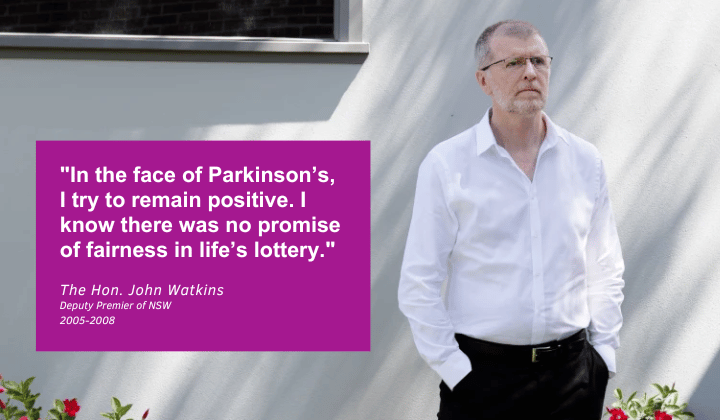Are we close to a cure for Parkinson’s?

My DBS Journey – Sharyn
5th April 2021
Flexibility exercises part 1
5th April 2021Are we close to a cure for Parkinson’s?

Are we close to a cure for Parkinson’s?
Saskia Mair of Parkinson’s Life interviews Sohini Chowdhury, Deputy CEO of the Michael J Fox Foundation.
How close do you think the scientific community is to finding a cure for Parkinson’s?
Whenever I say the word ‘cure’, I kind of put it in quotes. I think it’s important to remember that a cure can mean different things to different people.
If you’re able to improve the symptom management of the disease to an extent where having the disease has very little impact on your day to day life, that could be considered a cure.
If you’re able to slow or halt the disease progression so that the moment you get diagnosed, it never progresses beyond that point but you’re still taking a pill every day for the rest of your life, that could be a cure.
There’s a recognition now that Parkinson’s is not one disease experience. It is a disease experience that is very variable, so we have to be open minded because a cure for one person could be very different than a cure for another person.
I think the fact that this is now accepted in the research community is a good thing for patients. It’s not a one size fit all approach. We have finally understood that we need lots of different cures to fit the different patient experiences under the name ‘Parkinson’s disease’.
In terms of how close we are – is it tomorrow? Absolutely not. But there’s so many resources, money, scientific knowledge, and brainpower across the world being put forth into this.
It makes us hope that we’re not talking 50 years out – we’re talking about advances that could really make a substantial impact on a person’s day to day experience of the disease being a few years out. We’re very hopeful that is indeed the case.
What are scientists aiming to achieve in the near future through research?
This is an unbelievably robust time for Parkinson’s research in that drug development and the therapeutic development pipeline is incredibly varied. I think that’s what’s really exciting.
The experience patients have with the disease is so variable. So, the fact that we have all these different approaches to trying to develop therapies gives a greater likelihood that we are going to come up with interventions to tackle these different parts of patient experiences.
It’s incredibly exciting to see not just researchers, but the biopharma sector and the investor community put resources into exploring all of these different approaches. It’s not like everybody has their eggs in one basket – we’re seeing a lot of different baskets, and that’s potentially really beneficial for the patient community.
What area of Parkinson’s research are you are excited to find out more about?
Particularly in this COVID world that we’re living in, one of the things that is really exciting is we’re increasingly seeing the role that technology can play in helping to track the disease experience of patients.
In this unprecedented year, we’ve seen such a such an emphasis on sheltering in place, particularly among our vulnerable populations. We have an online clinical study called Fox Insight and we’ve really seen an increase in registrations because it shows the potential of being able to participate in research from the safety of your own home, and still contribute to sharing knowledge about the disease.
In the US, we’ve also seen the embrace of Telemedicine as a way to continue to think about managing care – but not necessarily having to go into a doctor’s office.
I think all of these experiences, coupled with ongoing advances in sensor technologies or smartphone applications really show us the way technology can ease the burden, both of managing the disease and participating in research.
I think that might be a little bit of a silver lining in a world where there aren’t very many silver linings at the moment.
Which scientific breakthroughs could have a big impact for the Parkinson’s community?
I think the concept of precision medicine or personalised medicine has now been integrated in Parkinson’s disease research. We’re still in the early days of it, but we’re trying to go that route. Right now, it’s very much focused on genetics underpinning Parkinson’s disease, and there are quite a few trials looking at therapies targeted for particular groups who have a genetic mutation.
That’s the first step. The second step is taking that data and understanding what it could mean for a broader patient community who may not have that genetic mutation. I think the fact that we’re trying to target things and make sure that the right therapy is being tested in the right patient population is very exciting.
The other thing, which is very similar to what the Alzheimer’s community has been doing, is that there’s an opportunity to start to think ‘how do we prevent the onset of symptoms?’. We know that prior to an individual having symptoms of the disease and getting diagnosed with Parkinson’s disease, they probably have had the disease for a while.
So how do we get that information to be able to intervene that much earlier before the symptoms start? There may be a day where we can say ‘it’s about preventing Parkinson’s disease from ever beginning’.
What are your hopes for the future of Parkinson’s research?
We really are incredibly hopeful that a lot of the research that we’re supporting is going to yield a tangible benefit for patients.
A cure may still be a few years out, or several years out or a decade. But there’s so much we can do between then that will impact a person who’s living with Parkinson’s in a very positive way.



